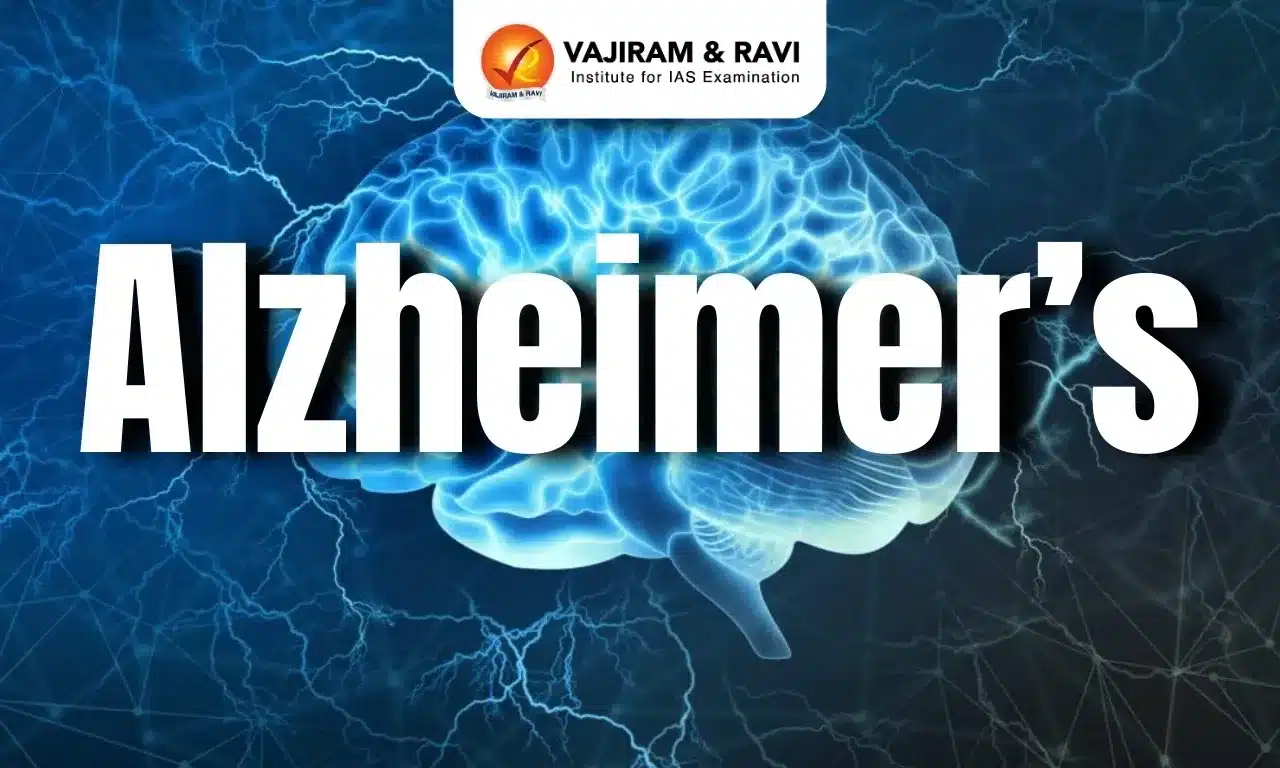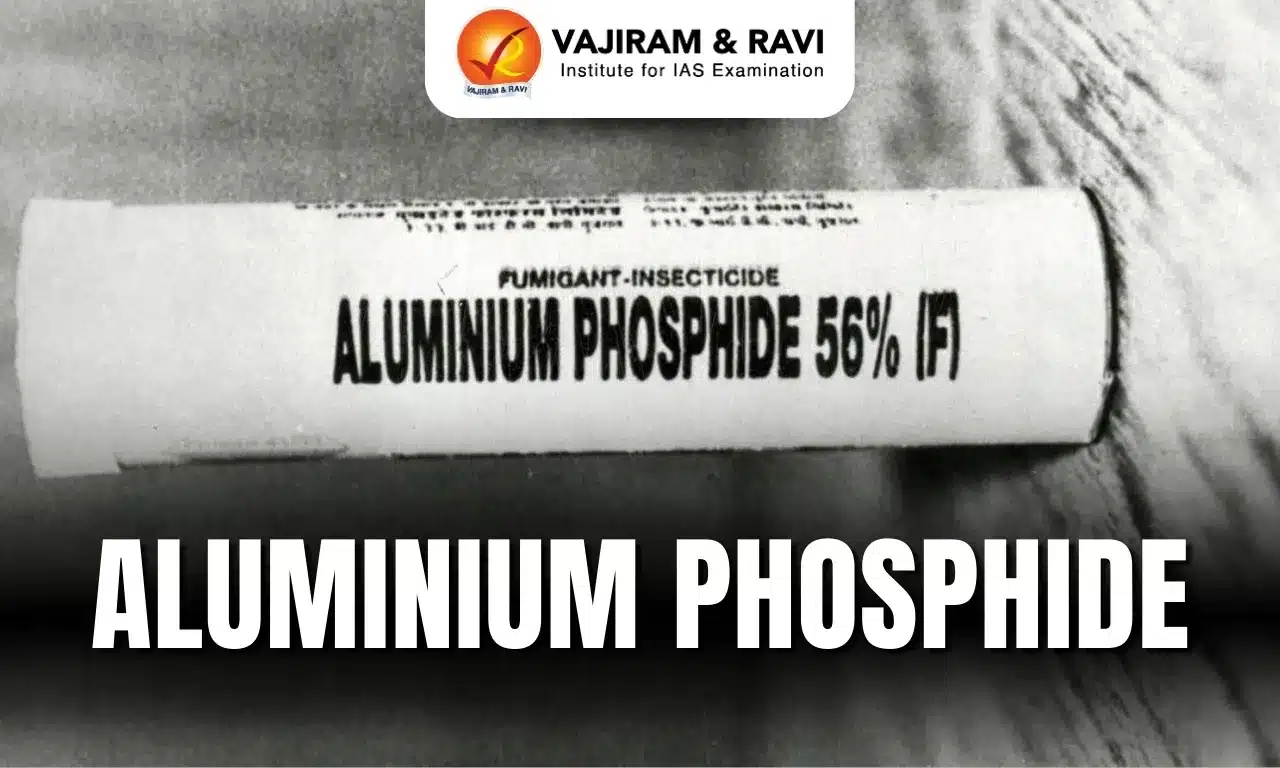Alzheimer’s Latest News
A new drug, Gantenerumab, shows promise in slowing early-onset Alzheimer’s while significantly reducing amyloid plaque buildup, a key marker of the disease.
About Alzheimer’s
- Alzheimer’s disease is a progressive neurodegenerative disorder that primarily affects memory, thinking, and reasoning abilities.
- It is the most common cause of dementia, accounting for 60-80% of all dementia cases worldwide.
- The disease disrupts communication between brain cells, leading to a decline in cognitive and functional abilities.
What is Early-Onset Alzheimer’s?
- Most cases of Alzheimer’s occur in individuals aged 65 or older, but around 5-10% of cases develop before this age—this is called Early-Onset Alzheimer’s Disease (EOAD).
- Unlike late-onset Alzheimer’s, EOAD progresses more rapidly and often affects people in their prime working years, making it particularly devastating.
- Genetic factors play a crucial role in early-onset cases, with mutations in three specific genes—APP, PSEN1, and PSEN2—linked to increased risk.
- The Role of Amyloid Beta and Plaque Formation: The buildup of amyloid beta proteins in the brain leads to the formation of amyloid plaques, a hallmark of Alzheimer’s disease.
- These plaques disrupt neural communication, trigger inflammation, and eventually lead to brain cell death.
- Amyloid-targeting therapies aim to reduce these plaques, potentially slowing disease progression.
About Gantenerumab
- Gantenerumab is an experimental drug that was initially discontinued but has now shown promise in new clinical trials.
- The latest trial focused on patients with genetic mutations known to cause early-onset Alzheimer’s.
- It was a randomized, placebo-controlled study, tracking disease progression using brain imaging and blood biomarkers.
- Results showed a significant reduction in amyloid plaque buildup, suggesting the drug may slow cognitive decline.
How Does Gantenerumab Work?
- It is a monoclonal antibody, meaning it is lab-engineered to specifically target amyloid beta proteins.
- Once attached to amyloid plaques, it signals the immune system to break them down and remove them from the brain.
- The drug activates microglial cells, which act as the brain’s primary immune defenders, to clear toxic proteins more efficiently.
- A major challenge in treating neurological diseases is the blood-brain barrier, which blocks many drugs from reaching the brain.
- Gantenerumab can cross this barrier, making it more effective than some previous Alzheimer’s treatments.
Alzheimer’s FAQs
Q1: What is Alzheimer’s disease?
Ans: Alzheimer’s is a neurodegenerative disorder that leads to progressive memory loss, cognitive decline, and behavioral changes due to brain cell damage.
Q2: What causes Alzheimer’s disease?
Ans: The exact cause is unknown, but it is associated with the accumulation of beta-amyloid plaques and tau protein tangles in the brain, along with genetic and environmental factors.
Q3: What are the symptoms of Alzheimer’s?
Ans: Early symptoms include memory loss, confusion, difficulty in problem-solving, and language impairment, which progressively worsen over time.
Q4: Is there a cure for Alzheimer’s?
Ans: No, there is no cure yet, but medications like Donepezil and lifestyle modifications can help manage symptoms and slow disease progression.
Q5: How can Alzheimer’s be prevented?
Ans: While prevention is not guaranteed, regular exercise, a healthy diet, mental stimulation, and social engagement may help reduce the risk of Alzheimer’s.
Source: DTE
Last updated on January, 2026
→ Check out the latest UPSC Syllabus 2026 here.
→ Join Vajiram & Ravi’s Interview Guidance Programme for expert help to crack your final UPSC stage.
→ UPSC Mains Result 2025 is now out.
→ UPSC Notification 2026 Postponed for CSE & IFS which was scheduled to be released on 14 January 2026.
→ UPSC Calendar 2026 has been released.
→ UPSC Prelims 2026 will be conducted on 24th May, 2026 & UPSC Mains 2026 will be conducted on 21st August 2026.
→ The UPSC Selection Process is of 3 stages-Prelims, Mains and Interview.
→ Prepare effectively with Vajiram & Ravi’s UPSC Prelims Test Series 2026 featuring full-length mock tests, detailed solutions, and performance analysis.
→ Enroll in Vajiram & Ravi’s UPSC Mains Test Series 2026 for structured answer writing practice, expert evaluation, and exam-oriented feedback.
→ Join Vajiram & Ravi’s Best UPSC Mentorship Program for personalized guidance, strategy planning, and one-to-one support from experienced mentors.
→ UPSC Result 2024 is released with latest UPSC Marksheet 2024. Check Now!
→ UPSC Toppers List 2024 is released now. Shakti Dubey is UPSC AIR 1 2024 Topper.
→ Also check Best UPSC Coaching in India

















